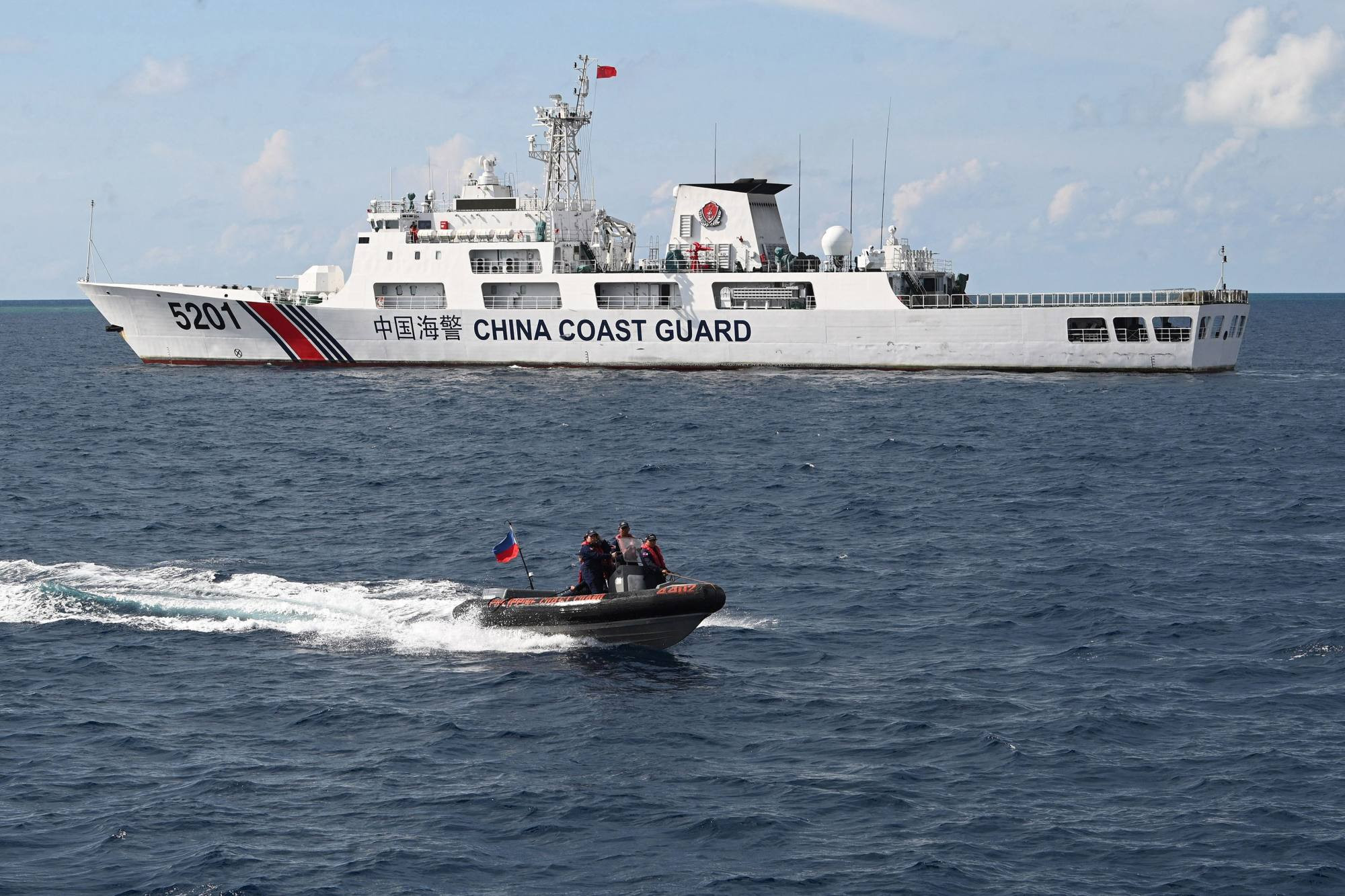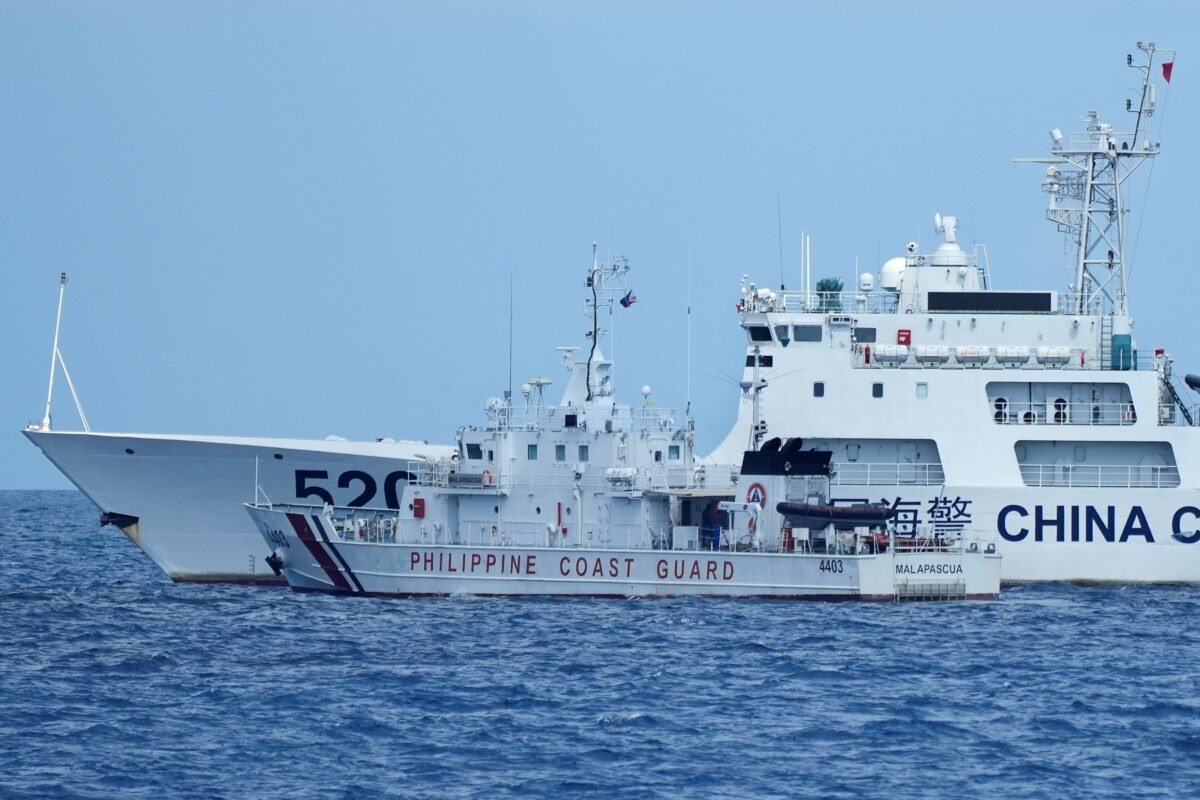The South China Sea is claimed by almost every country in the region but its ripple effects are felt well beyond the fiercely contested waterway. In the first of a three-part series, Alyssa Chen looks at the differences in China’s response to its maritime disputes with the Philippines and Vietnam.
But they did not rule out a tougher approach from Beijing in the future and said the issue could still cause problems.
In a statement posted on social media, Chinese coast guard spokesperson Liu Dejun was quoted as saying that a Philippine ship maneuvered and “deliberately collided” with a Chinese coast guard ship “in an unprofessional and dangerous manner.”
Philippine officials in Manila said it was their coast guard ship, the BRP Teresa Magbanua, that was rammed thrice by the Chinese coast guard without any provocation, causing damage to the Philippine vessel.
It was the second confrontation in days near Sabina Shoal, about 140 kilometers (85 miles) west of the Philippine province of Palawan, in the internationally recognized exclusive economic zone of the Philippines.
The Philippine ship, the Magbanua, has been anchored in Sabina since mid-April after Manila suspected that China may construct a structure to seize the uninhabited atoll. China harbored the same suspicions and recently filed a diplomatic protest against the Philippines due to the ship’s prolonged presence at the shoal.
China is rapidly expanding its military and has become increasingly assertive in pursuing its claim to virtually the entire South China Sea, which is crucial to international trade. The tensions have led to more frequent confrontations, primarily with the Philippines, and could drag in with the United States, which is bound by a treaty to defend the Philippines. The longtime territorial disputes also involve other claimants including Vietnam, Taiwan, Malaysia and Brunei.
China has rejected a ruling by a U.N.-backed arbitration panel that negated almost all of its historically based claims in the South China Sea.
Commodore Jay Tarriela of the Philippine coast guard said in a news briefing in Manila that the Magbanua had dropped its anchor again and would not withdraw from Sabina Shoal “despite the harassment, bullying activities and escalatory action of the Chinese coast guard.”
Video released by the Philippine coast guard appeared to show the Magbanua being rammed by a Chinese coast guard ship.
The United States condemned “the multiple dangerous violations of international law by the PRC (People’s Republic of China), including today’s intentional ramming of the BRP Teresa Magbanua while it was conducting lawful operations within the Philippines’ Exclusive Economic Zone.”
“We stand with the Philippines in upholding international law,” U.S. Ambassador to Manila MaryKay Carlson said in a statement she posted on X.
The United States has repeatedly warned that it’s obligated to defend the Philippines if Filipino forces come under an armed attack in the South China Sea.
On Tuesday, Adm. Samuel Paparo, the head of U.S. Indo-Pacific Command, said the U.S. military is open to consultations about escorting Philippine ships in the disputed waters.
China’s coast guard, navy and accompanying ships regularly clash with Philippine vessels during attempts to resupply Filipino sailors stationed in parts of the South China Sea claimed by both countries. As the confrontations become increasingly hostile, resulting in injuries to Filipino sailors and damage to their ships, the Philippine government has faced questions about invoking the treaty alliance with Washington.
Sabina Shoal is near Second Thomas Shoal, another flashpoint where China has hampered the resupply of Philippine forces. Both countries reached an agreement last month to prevent further confrontations at the shoal.
Also Saturday, Japan lodged a formal protest via China’s embassy against what it called an incursion by a Chinese survey ship into its territorial waters. The latest such incident fueled unease among Japanese defense officials, already concerned about the growing military cooperation between the Chinese and Russian air forces.
On Monday, Tokyo also protested a Chinese military aircraft briefly entering Japan’s southwestern airspace. Chinese foreign ministry spokesperson Lin Jian said on Tuesday his country had “no intention” to violate any country’s airspace.
Washington has rebuked Beijing following another collision between Chinese and Philippine coast guard vessels, marking the latest flashpoint in their long-running territorial dispute in the South China Sea.
"The United States stands with its ally, the Philippines, and condemns the dangerous and escalatory actions by the People's Republic of China against lawful Philippine maritime operations in the vicinity of Sabina Shoal," U.S. State Department Spokesperson Matthew Miller said in a statement on Saturday.
The collision was the latest of several confrontations near contested Sabina Shoal in August, followed an agreement between China and the Philippines in early July to de-escalate tensions. However, conflicting interpretations of the agreement have led to further confrontations.
The U.S. emphasized that China is asserting sovereignty over areas "where no land territory exists" and warned that its "increasingly aggressive actions" threaten the freedom of navigation and overflight for all nations. Miller also reaffirmed that the 1951 U.S.-Philippine Mutual Defense Treaty covers attacks on Philippine vessels "anywhere in the South China Sea."
Duan Dang, a maritime security analyst in Vietnam, considers China's actions represented "an attack in plain sight."
"The Chinese are laughing while officials in Washington and some in Manila hide behind legal definitions to justify doing nothing," he wrote on X (formerly Twitter) on Saturday.
"Why should the U.S. do more than its treaty obligations to the Philippines in response to China's aggression in the South China Sea? Because if the U.S. can't truly help the Philippines, other partners will start to question the value of their partnership," he warned in a later post.
Why should the U.S. do more than its treaty obligations to the Philippines in response to China's aggression in the South China Sea? Because if the U.S. can't truly help the Philippines, other partners will start to question the value of their partnership.
According to Philippine coast guard spokesperson Jay Tarriela, China's coast guard "deliberately rammed and collided" with the Teresa Magbanua three times "despite no provocation."Tarriela also shared photos to X showing minor structural damage sustained by the Philippine vessel in the collision.
The Philippines has stationed one of its largest coast guard vessels, the BRP Teresa Magbuana at Sabina Shoal's lagoon since April after discovering crushed coral piles, raising concerns that China might build an artificial island. In response, China has maintained a continuous maritime presence, and had in recent weeks blocked Philippine attempts to deliver supplies to the ship.
This afternoon, the Chinese Coast Guard vessel deliberately rammed and collided with the BRP Teresa Magbanua three times, despite no provocation from the Philippine Coast Guard. pic.twitter.com/jYnrXKpY3W
Manila has vowed to maintain its presence in the area, while China accuses the Philippines of using the ship as a pretext for an indefinite presence, similar to the Philippines' grounded warship at Second Thomas Shoal.
The Spratly Islands' Sabina Shoal, located 86 miles from the Philippine Province of Palawan, lies within the Philippines' exclusive economic zone, where international maritime law grants the Philippines exclusive access to resources. However, China's territorial claims overlap with those of several Southeast Asian nations, leading to ongoing disputes.
The incident occurred after the Teresa Magbanua pulled anchor just after 8 a.m. and began to "maneuver and cause trouble" in Sabina Shoal's lagoon, according to a China Coast Guard statement shared by the country's embassy in the Manila.
Chinese coast guard ship 5205, "took measures such as issuing warnings... in accordance with laws and regulations," spokesman Liu Dejun added. He faulted the Teresa Magbanua with "deliberately" colliding with its Chinese counterpart at 12:06 p.m.
Liu demanded the Southeast Asian country not "create hot spots or escalate the situation," warning it would "bear all the consequences."
The European Union on Sunday issued a statement condemning the "dangerous actions by Chinese coast guard vessels against lawful Philippine maritime operations in the South China Sea.
The Australian foreign affairs department on Monday also weighed in, citing the "repeated and intentional ramming of Philippine vessels and uring China to "cease these actions, resolve disputes peacefully, and adhere to international law.
China claims sovereignty over most of the South China Sea, which overlaps with the territorial claims of the Philippines, Vietnam, Indonesia, Malaysia, Brunei, and Taiwan. An international tribunal at The Hague's Permanent Court of Arbitration dismissed China's claims in a landmark ruling brought by the Philippines. China, however, rejected the ruling and has continued to assert its claims in the region.
Micah McCartney is a reporter for Newsweek based in Taipei, Taiwan. He covers U.S.-China relations, East Asian and Southeast Asian security issues, and cross-strait ties between China and Taiwan.
You can get in touch with Micah by emailing [email protected].
Micah McCartney is a reporter for Newsweek based in Taipei, Taiwan. He covers U.S.-China relations, East Asian and Southeast Asian ...
Read more
Newsletters in your inbox See all
Company
Editions:
Contact
Terms of Use
© 2024 NEWSWEEK DIGITAL LLC
China and the Philippines have accused each other of ramming coast guard vessels in a disputed area of the South China Sea.
The Philippines has claimed a Chinese ship "directly and intentionally rammed" into its vessel, while Beijing has accused the Philippines of "deliberately" crashing into a Chinese ship.
Saturday's collision near the Sabina Shoal is the latest in a long-running - and escalating - row between the two countries over various islands and zones in the South China Sea.
Within the past two weeks, there have been at least three other incidents in the same area involving ships belonging to the two countries.
The Sabina Shoal, claimed by China as Xianbin Jiao and as Escoda Shoal by the Philippines, is located some 75 nautical miles from the Philippines' west coast and 630 nautical miles from China.
The South China Sea is a major shipping route through which $3 trillion worth of trade passes through a year. Beijing claims almost all of the South China Sea, including parts claimed by the Philippines, Brunei, Malaysia, Taiwan and Vietnam.
Following the latest clash, China's coast guard called on the Philippines to withdraw from the Sabina Shoal while pledging to "resolutely thwart all acts of provocation, nuisance and infringement".
The Philippines coast guard said it would not move its vessel - the Teresa Magbanua - "despite the harassment, the bullying activities and escalatory action of the Chinese coast guard".
There were no casualties following the crash but Philippines Coast Guard Commodore Jay Tarriela said that the 97-meter (318-feet) Teresa Magbanua had sustained some damage after being hit "several times" by the Chinese ship.
The US ambassador to the Phillipines, MaryKay L Carlson, criticised what she called China's dangerous actions in the region.
"The US condemns the multiple dangerous violations of international law by the [People's Republic of China], including today's intentional ramming of the BRP Teresa Magbanua while it was conducting lawful operations within the[Philippines] EEZ." she wrote in a post to X.
"We stand with the Philippines in upholding international law."
China has repeatedly blamed the Philippines and its ally the US for the escalating tensions. Last week, a defence ministry spokesperson said Washington was "emboldening" Manila to make "reckless provocations".
Observers worry the dispute could eventually spark a larger confrontation in the South China Sea.
This was the fifth time in a month that China had confronted Philippine law enforcement agencies within the country’s own EEZ, as China goes all out to push the Philippines away from this shoal and others. The presence of two naval tugboats suggested China might even have been contemplating towing the Philippine vessel away after immobilising it.
China says its actions are “‘professional, restrained and appropriate”, whereas the majority recognise them as unprofessional, dangerous and inappropriate. For example, the New Zealand Embassy in Manila stated, “This latest incident, with a CCG vessel ramming a Philippine vessel, is profoundly troubling and fits a recent pattern of dangerous and destabilising actions in the region. New Zealand calls for de-escalation and compliance with international law, in particular UNCLOS.”
The USA vocalized its condemnation too. Rear Admiral Andrew M. Sugimoto, Deputy Commander, US Coast Guard (USCG) Pacific Area, said:
“We unequivocally condemn the ramming of vessels. The whole point of rules on the water is so that we don’t run into each other, and so this is a clear act of bullying by one individual that wants to exert its influences over another nation with complete disregard for the rules and the international law that exists.”
A previous attempt by the Philippines to get the United Nations to arbitrate ended with the decision that China had no lawful claims within its so-called nine dash line, the boundary it uses to claim a large swathe of the South China Sea. Beijing has refused to recognise the ruling.
But in recent weeks both countries have made an attempt to de-escalate the immediate conflicts out at sea.
Last month they agreed to allow the Philippines to restock the outpost in the Second Thomas Shoal with food, supplies and personnel. Since then this has taken place with no reported clashes.
RADM Sugimoto, who was promoted to his post in July, asked which international rules condoned ramming as a measure for upholding international law, especially when collision regulations are designed to prevent vessels from hitting each other. “So it’s a little astounding to say that I’m going to break the law in order to uphold the law. It just doesn’t make sense, and I think most nations out there see that as unsafe and unprofessional conduct, which only highlights and further emphasises the bullying that is going on, right?”
This afternoon, the Chinese Coast Guard vessel deliberately rammed and collided with the BRP Teresa Magbanua three times, despite no provocation from the Philippine Coast Guard. pic.twitter.com/jYnrXKpY3W
The USCG rear admiral continued, “…We stand together with the Philippines and we condemn the actions of aggressive individuals that do such things as ram or try to prevent humanitarian supplies from reaching individuals resupplying their fellow citizens…” He pointed out that using water cannons to flood or sink vessels is “not what we call safe and professional operations”.
Responding to a Naval News question about the best way to counter China’s mounting aggression, RADM Sugimoto replied: “One is to demonstrate what those international rules-based orders are that are so important for us to follow, and for us to lead by example, along with our partners. It’s to point out those transgressions that occur from nations that are counter to those things, and help them understand how the rest of the world wants to operate. We can afford training in terms of legal capacity or maritime domain awareness, or even conduct joint exercises at sea so that they can see that we’re united in our will to uphold that rules-based order that’s so important.”
The USCG representative noted that global consensus does matter, and that if the world continues to condemn China’s actions, then “perhaps they’ll change the way they do business”. He elaborated: “China wants to be seen as a member of the world that has a set of rules and enforces it, but whenever they do things like ramming or water cannoning unarmed vessels, it does not appear to be so. When they uphold the rules themselves and they stand and lead by example, that’s when the rest of the world will notice that they are in fact world leaders and not bullies.”
However, this appears a forlorn hope. The CCG, along with the China Maritime Militia and People’s Liberation Army, has been exhibiting increasing aggression against the Philippines. In order to illegally grab maritime territory, Beijing is willing to pay a reputational price as the number of dangerous incidents by Chinese ships and aircraft has surged in the past 18 months or so.
At what stage could the Philippines and USA invoke their Mutual Defense Treaty in the face of such provocations? RADM Sugimoto, speaking to media by telephonic conference from the Philippines, could not answer that question, but he did say, “We stand with the Philippines and we’ll continue to work with them and, if Article IV is invoked, we’ll stand with the Philippine Coast Guard and everybody else that is a part of – that we have a mutual defence treaty with … It’s not something that I personally can specifically drive towards, but that’s the reason that we want to continue to work together – so that interoperability, our ability to have effective communications, to be able to have effective maritime domain awareness of what’s going on out there – all of those things are so that we can be as effective as possible and continue to push back against those nations that want to exert their influences solely for their purposes at the expense of other law-abiding nations.”
RADM Sugimoto, who is based in Alameda, California, said he is “grateful for the professional and truly safe way in which the Philippines has responded back to this, because it really demonstrates that this nation, the Philippines, do stand for the conduct that we all recognize is what we want in this world, and not that of the other individual that keeps bullying smaller nations.”
He said the PCG is family to the USCG. “We’re working with the Philippine Coast Guard in a number of different ways through training, through helping them with the organisation and buildout of the Philippine Coast Guard. We’ve transferred vessels to the Philippine Coast Guard, helped them with the operations, maintenance of those particular vessels. We’re looking for whatever the Philippine Coast Guard wants us to help them with. That’s what we’re here for in training, capacity building, legal structures, building out the laws necessary to support them, maritime domain awareness, any of those things.”
However, against such a backdrop, American support for treaty allies like the Philippines is under scrutiny. If China succeeds in evicting the Philippines from this shoal, or any other, the USA is in danger of losing legitimacy in the eyes of regional countries.
However, the USA insists it is providing all the assistance the Philippines wants, and that it is invested in supporting regional coast guards in capacity building and holding China to account.
The UCSG official commented on broader regional interaction: “There have been many nations that have reached out to the United States Coast Guard, and we look forward to working with each and every one of them. We’ve shifted some resources to the Pacific specifically in order to be able to meet those commitments. We’re deploying a ship called our Indo-Pacific support cutter, which is out there going around the Pacific Island nations providing training and assistance. We do patrols in the Western Pacific. We’ve had two ships this past year that have been out there conducting exercises with all of our partners – Korea, Japan the Philippines – and just recently the coast guard cutter Waesche came back from a very successful patrol in the Western Pacific.”
RADM Sugimoto said the USCG is helping in real-world operations. One example was assisting the PCG to remove fuel from the tanker Terra Nova after it sank during a typhoon in Manila Bay on 25 July. The USCG has also helped conduct search-and-rescue operations in the Pacific, offering technical advice with things such as drift patterns.
Furthermore, “…There’s this growing interest to want to work together to continue to uphold those very precious rules that we all depend on in order to be able to coexist safely and peacefully on the planet together. And there are a growing number of individuals that want to talk to us about it.”
Trilateral coast guard cooperation between Japan, the Philippines and USA will increase, RADM Sugimoto explained. “It really isn’t about one nation trying to push its points, but it’s an example of us all coming together wanting to uphold the rules-based order that we find so important in our ability to conduct commerce, to feed our citizens, to safely protect them on the waters, to protect the environment – all of those things.”
The cutter Waesche recently hosted observers from the PCG, Japan Coast Guard and Vietnamese Coast Guard for 13 days, and “we were able to highlight how we do operations, show how we want to reinforce rules-based order out there, safely conduct certain operations, help and show them what and how we do maintenance on our ships”. He said future ship-rider events are on the cards too.
RADM Sugimoto said he was looking forward to the time where we’ll “increase the number of nations that are coming together, and not just trilateral but quadrilateral or any number of others – the ASEAN nations, around the globe – in supporting these efforts as we move out.”
He reminded his audience, “There’s a lot going on in this world, and I think it’s just very important that we continue to highlight the importance of rules-based and lawful operations on the ocean, as the ocean interconnects all of us and allows us to have economies that flourish and prosper…” Indeed, he pointed out that 90% of commerce flows through the oceans.
He said the USA upholds such standards it is promulgating.
“We conduct freedom of navigation exercises or transits throughout the world. We’re a firm believer in reinforcing the right of every nation to be able to transit freely, as long as they do so in accordance with customary law and international law. It’s an important part of upholding rules-based order. Similarly…we do not aggressively harass Chinese vessels or other vessels in the world when they come north into the Arctic off of Alaska or in other places. We respect their right to transit when they want to go through the Aleutian Islands, and so we expect the same ability to do so wherever we are in international waters to be able to freely and safely navigate according to those rules that are out there.”
Legal / Privacy Policy
About Us
Contact Us


















